Snoring & Sleep Apnea Treatment - Albuquerque, NM
Start Getting the Rest You Deserve
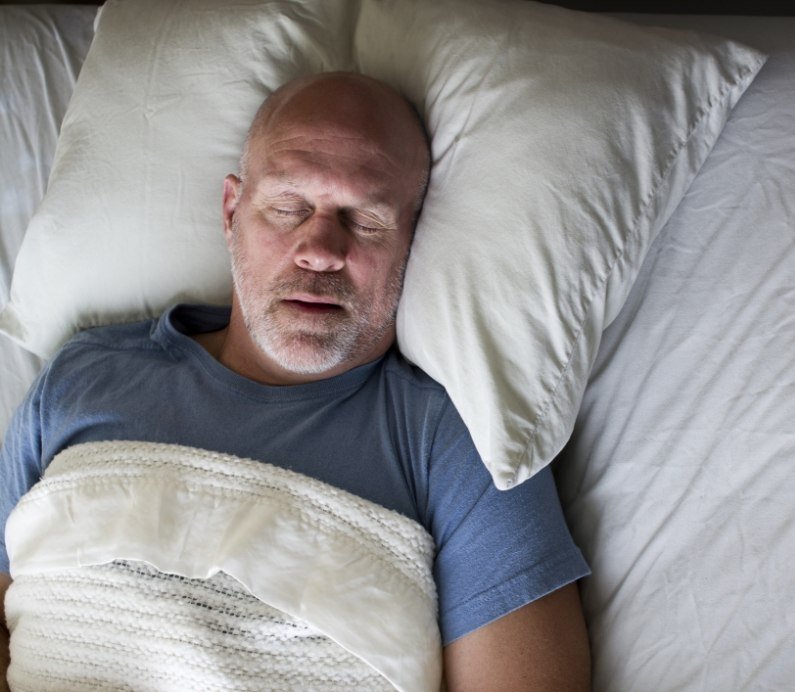
More than 20 million Americans currently suffer from sleep apnea, and surprisingly, about 80% of these cases are undiagnosed, meaning they are going untreated. Do you feel tired in the morning and throughout the day no matter how much you sleep? Have friends and family told you that you snore loudly? Have you almost dozed off behind the wheel? If so, the proven solutions at the Center for Dental Sleep Medicine and TMJ of New Mexico might be exactly what you need. Thanks to our expertise and scientific approach to care, we can help you not only sleep better, but protect your long-term health as well as with snoring and sleep apnea treatment in our Albuquerque, NM dental office. If you’re ready to start getting the rest you deserve, give us a call today!
Why Choose Center for Dental Sleep Medicine and TMJ of New Mexico for Snoring & Sleep Apnea Treatment?
- Able to Directly Treat the Source of Sleep Apnea
- Fast & Pain-Free Nightlase Treatment for Snoring
- Happy to Accept Medical Insurance
What Is Sleep Apnea?
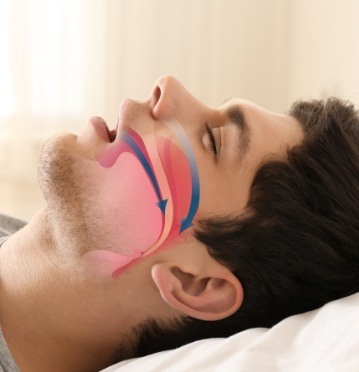
Sleep apnea is characterized by someone having brief but frequent pauses in their breathing while sleeping. This can be due to the tissues in the throat collapsing together to obstruct the airway, or the brain may not be sending the right signals to the body to breathe. Regardless, this causes a sudden drop in oxygen, forcing the body to partially wake up to restore normal respiration. These episodes can occur so quickly that a person doesn’t even notice them. In the most severe cases, a person can stop breathing up to 100 times an hour.
Symptoms of Sleep Apnea
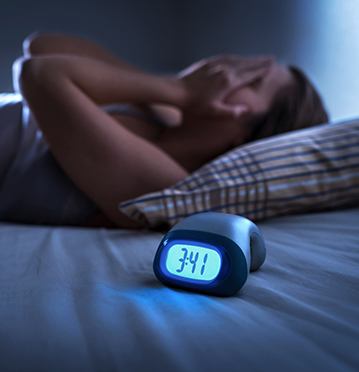
Millions of Americans suffer from sleep apnea whether they know it or not. The common disorder causes breathing disturbances while you sleep. Your breath may pause from time to time or your breathing could become very shallow. In some cases, both of these things may happen. Although snoring is one of the hallmark symptoms of sleep apnea, it’s not the only one you should keep an eye out for. Symptoms can vary from person to person, making it difficult to spot the disorder unless you know what to look for. If you experience any of the following, you may have sleep apnea.
Excessive Daytime Fatigue
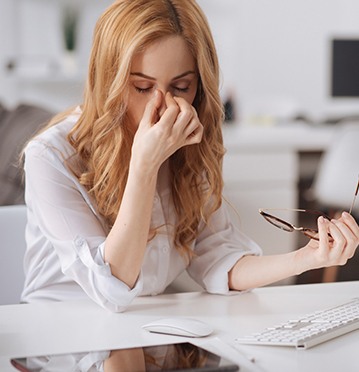
The frequent awakenings associated with sleep apnea make it difficult to get normal, restorative sleep. As a result, it’s common for patients to experience severe daytime drowsiness, irritability, and fatigue. You may have difficulty concentrating throughout the day and find yourself falling asleep doing mundane tasks, like working, watching TV, or driving. Because of this, people with sleep apnea are at higher risk of motor vehicle and workplace accidents.
Dry Mouth
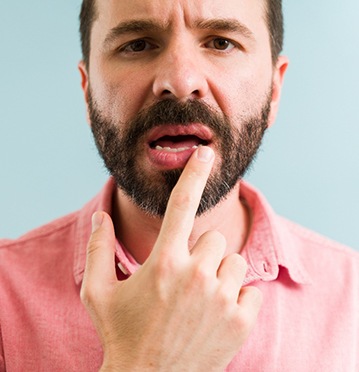
One study reveals that over 30% of obstructive sleep apnea (OSA) sufferers experience morning dry mouth. That’s mainly because sleep apnea tends to force mouth breathing, which leads to dry mouth. It’s worth noting that using a continuous airway pressure (CPAP) machine to treat sleep apnea can also contribute to dry mouth.
Morning Headaches
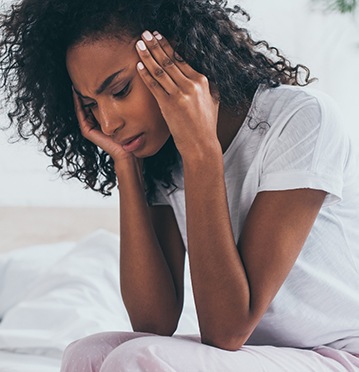
Although researchers are still unsure what causes headaches in patients with sleep apnea, it’s believed to be related to low blood oxygen levels during sleep or sleep disturbances caused by lapses in breathing. Because it allows less oxygen to reach the brain, carbon dioxide accumulates in the bloodstream, causing blood vessels in the brain to expand. As the pressure from that expansion builds up, it may develop into a headache. Of course, some researchers claim that the headaches are merely a symptom of poor sleep.
Chronic Snoring
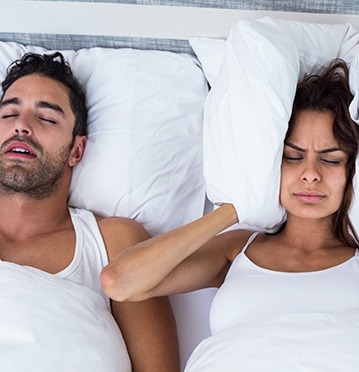
Not all people who snore have sleep apnea. However, if the loud snoring is accompanied by any of the symptoms listed above, it may be an indication of OSA. The disorder is characterized by loud snoring followed by periods of silence when breathing stops or nearly stops. These pauses in breathing may eventually cause you to wake up with a loud snort or gasping sound.
The Dangers of Untreated Sleep Apnea
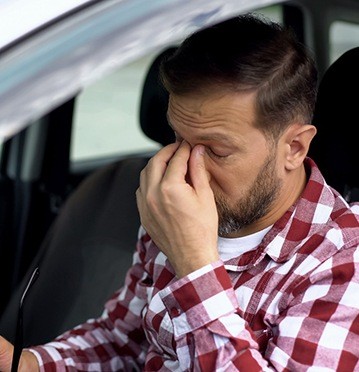
Sleep apnea can affect more than just your ability to rest and feel energized throughout the day. Apnea episodes are extremely stressful on the cardiovascular system and cause a large spike in blood pressure that can last for several hours, even after normal breathing is restored. As a result, sleep apnea has been shown to dramatically increase someone’s risk of heart attack and stroke. Left untreated, sleep apnea can lead to severe consequences in both the short and long term, many of which can ultimately prove to be fatal. Not only that, but sleep apnea can also affect the people closest to a patient, causing them to develop serious health issues as well. By better understanding the risks, you can know just how important it is to get sleep apnea treatment in Albuquerque as soon as possible.
Short-Term Dangers of Sleep Apnea
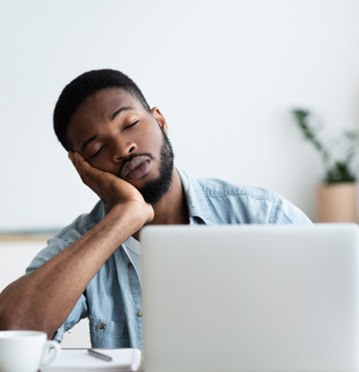
One of the primary symptoms of sleep apnea is fatigue and exhaustion. While this in itself is unpleasant, it is also extremely dangerous in certain situations, like for people who regularly drive or operate heavy machinery. Each year, hundreds of motor vehicle accidents are attributed to tired, under-rested drivers, and a large percentage of them are found to be suffering from sleep apnea.
In multiple studies, it has been shown that driving while drowsy is actually worse compared to driving while drunk when it comes to accident risk. This is why many long-haul trucking companies require their drivers to undergo a sleep test before hitting the road.
Long-Term Dangers of Sleep Apnea
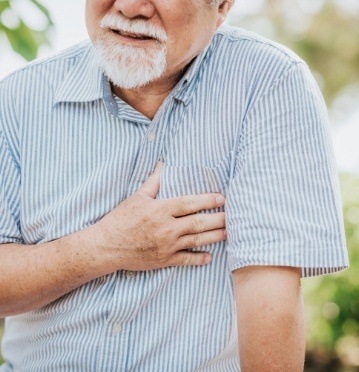
Over time, sleep apnea can lead to:
- Depressive thoughts
- Increase in anxiety
- Focus/memory problems
- Rapid weight gain/problems losing weight
- High blood pressure
- Huge increase in the risk of heart attack and stroke
This condition can be extremely damaging to both someone’s mental and physical health, and when it comes to obesity and weight gain, the relationship is particularly insidious. Being overweight is one of the primary preventable causes of sleep apnea, but at the same time, sleep apnea can also cause someone to gain weight rapidly. This is because chronic tiredness can make it almost impossible to have the energy to exercise, plus sleep deprivation throws off the balance of a person’s “hunger hormones,” leptin and ghrelin. This causes those with sleep apnea to crave calorically dense, sugar/carbohydrate-rich foods, plus it can take about 500 extra calories a day to help them feel full.
How Sleep Apnea Harms Those Around You
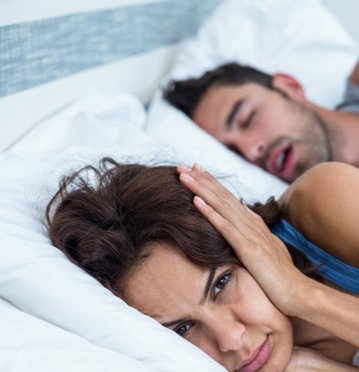
It’s difficult to be a good parent, partner, friend, or employee when you’re exhausted all the time. Those with sleep apnea describe having less patience or “shorter fuses,” causing them to lash out at those around them, which can strain both personal and professional relationships.
And, because sleep apnea is often accompanied by loud, persistent snoring, just living with someone with the condition can cause sleep loss. This results in a household filled with tired, irritable people who are at an increased risk of a laundry list of health issues.
Suffice it to say, if you think you have sleep apnea, it’s not just good for you to get sleep apnea treatment in New Mexico, but it will also improve the lives of the people you care about most!
Who Do We Treat?
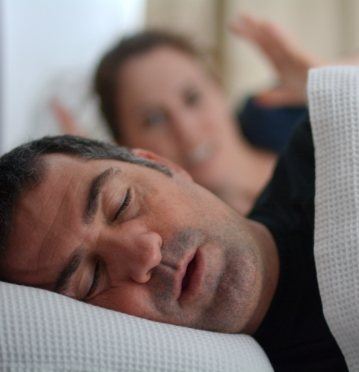
Absolutely anyone, at any age, can suffer from sleep apnea. Thankfully, Dr. Jariwala has years of experience treating a wide range of people, meaning she can shape her approach based on someone’s unique needs. Her ability to provide multiple options means that anyone with sleep apnea can trust she’ll be able to provide a lasting solution.

Men
Men tend to suffer from sleep apnea about 2-3 times more often than women. This is because they usually have more risk factors, with obesity, smoking, and excessive alcohol use being the main ones. Because many men work in jobs where they operate heavy machinery, sleep apnea therapy cannot only protect them from dire health consequences, but their coworkers as well.

Women
Even though it is rarer, women can experience sleep apnea as well. Their risk tends to go up notably after menopause. Sleep apnea and craniofacial pain often occur in tandem in women because they are more likely to experience TMJ problems and teeth grinding.
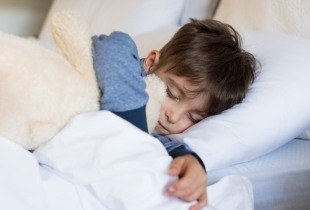
Children
About 2-4% of children can develop what is called Sleep Disordered Breathing, which can manifest as chronic snoring or sleep apnea episodes. With children, instead of being tired, sleep apnea can cause them to be hyperactive and have trouble focusing, which is why it is often misdiagnosed as ADD/ADHD. Fortunately, the issues tend to subside once a child’s sleep is under control.
How We Treat Sleep Apnea
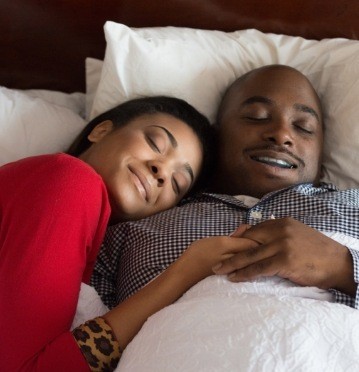
Most forms of sleep apnea treatment are solely designed to manage the symptoms, which can certainly provide relief for patients, but they don’t address the underlying issue, meaning the disorder never fully goes away. This is why our team strives to discover the root source of someone’s sleep apnea, and then we can treat it directly, leading to better rest, better health, and a much lower risk for serious health complications down the line.
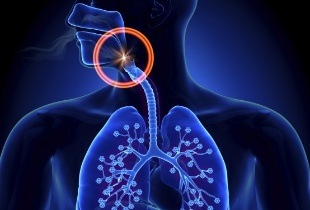
Nightlase Laser Airway Management
Snoring and sleep apnea are often caused by loose tissue toward the back of the throat that collapses together throughout the night. With Nightlase, we can provide a gentle treatment that tightens this tissue to open up the airway and prevent future problems. The laser encourages collagen production to make the tissue naturally firm up. This procedure is extremely comfortable, and the recovery time is practically non-existent.
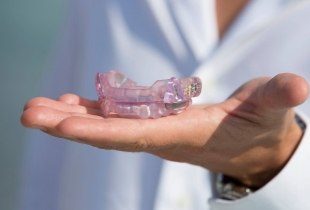
Oral Appliance Therapy
A custom-made oral appliance can be prescribed as a less invasive alternative to traditional CPAP therapy. These are only worn to bed, and they work by slightly shifting the jaw forward and/or keeping the tongue in a neutral position. This prevents the airway from becoming blocked. Certain appliances can also protect the teeth from grinding (which can contribute to sleep apnea), and with children, they can direct the development of the mouth to increase the size of the airway.
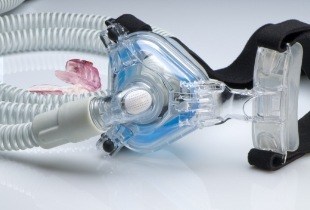
Combined Therapy
For patients with severe sleep apnea, CPAP therapy may be absolutely necessary to get quality sleep. However, the machine can often be very loud and uncomfortable, causing a patient to forgo treatment altogether. With combined therapy, a patient wears an oral appliance while using their CPAP. Thanks to the assistance provided by the oral appliance, the airway is partially opened, so the CPAP can be put on a lower setting, making it quieter and easier to use.
Is Sleep Apnea Therapy Covered by Insurance?

Many people would like to get help for their sleep problems, but they are concerned about the financial aspect of their care. Patients often ask us if their insurance will cover their treatment. In many cases, yes, sleep apnea therapy is covered. However, there are some stipulations to keep in mind. Read on below to learn more about how your benefits might apply.
Options for Sleep Apnea Therapy
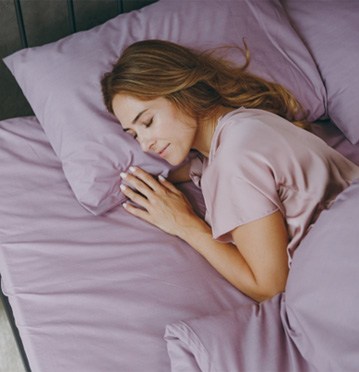
Here at the Center for Dental Sleep Medicine & TMJ of New Mexico, we offer a few different treatments to help patients find relief from their obstructive sleep apnea (OSA) symptoms. For example, we often recommend that patients wear an oral appliance to gently reposition their jaw and allow for uninterrupted breathing. In other cases, we urge patients to combine their oral appliance with the use of a CPAP machine.
Another option that is suitable for some patients is Nightlase treatment, which uses a laser to tighten tissues in the throat. This prevents the airway from collapsing and can greatly reduce or even eliminate nighttime breathing interruptions.
Does Medical Insurance Help to Pay for Treatment?

Even though Dr. Jariwala is a dentist, the OSA treatment options in our practice are not covered by dental insurance. However, medical insurance is a different story. Because medical insurance aims to help policyholders care for generalized health issues, it very often covers sleep apnea services.
For example, your policy is likely to cover your initial sleep exam, which will determine whether you have OSA and how severe your condition is. It may also cover your treatment. Both CPAP machines and oral appliances are classified as durable medical equipment, so insurance is usually willing to help pay for them.
Nightlase, however, is less likely to be covered. Although it is very effective, it has not yet been accepted as a mainstream treatment for OSA. Therefore, you may need to pay for it out of pocket.
Of course, you should not take anything for granted. It would be wise to get in touch with your insurance company to find out exactly what they will cover and whether you will be responsible for any portion of your bill.
Other Options for Making Sleep Apnea Therapy Affordable
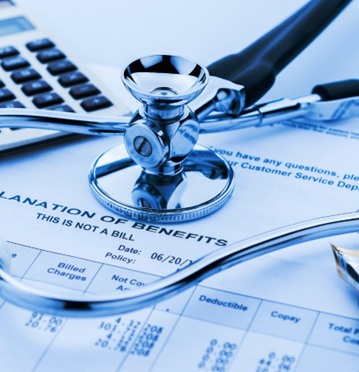
We are happy to help patients maximize their insurance benefits. However, if you do not have insurance, your insurance will not cover all of your treatment, or you wish to undergo Nightlase therapy, you may still have some concerns about cost.
We understand that, so we accept financing through Sunbit. The majority of patients who apply are approved. You will be able to pay for your treatment in manageable installments over time. If you are interested in learning more about it, simply ask our friendly team!
Sleep Apnea FAQs
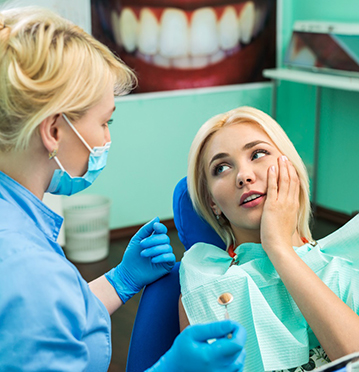
Sleep apnea is a more widespread problem than many people realize, and having it promptly treated by a professional is of the utmost importance. Before you begin your sleep apnea therapy, however, we want to make sure that there aren’t any lingering questions or concerns on your mind. Please reach out to us if there’s anything you’d like to know about sleep apnea and how it’s treated. Below, we’ve provided answers to some of the sleep apnea questions that we’ve received from patients in the past.
How Long are Sleep Apnea Events or Episodes?
For a pause in breathing to be considered a sleep apnea episode, it needs to last 10 seconds or longer. Sometimes these pauses can be as long as 2 minutes. Additionally, depending on how advanced your sleep disorder is, you may experience anywhere between 5 to 30 episodes in a single hour of sleep.
A sleep test can help determine how often your sleep apnea episodes are occurring as well as how long they tend to last. If you’re only having up to 15 episodes per hour, your sleep apnea will be considered mild; more than 30 is a severe disorder.
Will My Sleep Apnea Go Away If I Lose Weight?
In some cases, it might. People who have excess weight tend to have a higher risk for tissues collapsing and blocking the airway. If you lose weight, it can reduce the amount of tissue around your airway, making it less likely that it will become obstructed during the night.
That being said, some people continue to experience sleep apnea symptoms even after they lose weight. The only way to confirm whether you still have the disorder is to have another sleep test performed.
How Should I Clean My Sleep Apnea Oral Appliance?
Bacteria and food particles can accumulate on your oral appliance if you’re not careful about cleaning it every day. It’s recommended that you take the time to brush your oral appliance in the morning right after you take it out of your mouth. Be sure to rinse it off afterward.
When your oral appliance isn’t in your mouth, it should be in its case so that it’s protected from possible contaminants. Additionally, if you want to be as thorough as possible when cleaning the appliance, you can use a denture cleaner.
Can I Have Oral Appliance Therapy If I Grind My Teeth?
Some people who have bruxism – a condition that causes you to grind your teeth while you’re asleep – might be nervous about getting an oral appliance. However, the appliances used to treat sleep apnea are designed in a way that lets them easily stand up to the forces of grinding and clenching. As a matter of fact, a side benefit of using an oral appliance is that it can help prevent the upper and lower rows of teeth from coming into contact with each other, thus protecting them from the damage that bruxism can cause.
Why Should I See a Dentist for Sleep Apnea Treatment?
At first, it might seem strange that you should visit a dentist for a medical problem like obstructive sleep apnea (OSA). However, dental professionals are uniquely qualified to provide OSA treatment, especially if they have undergone extra training. Sleep dentists have an intimate understanding of how the upper airway works and how it relates to structures within the mouth. They can provide effective treatment and personalized advice on how to improve nighttime breathing.
Does Everyone Who Snores Have Sleep Apnea?
Snoring and OSA are two separate issues. Snoring is simply the noise that results when air moves past structures in the throat, causing the tissues to vibrate. Occasional light snoring is usually nothing more than a harmless annoyance. It can afflict you when you are extra-tired, when you consume alcohol before bedtime, or when you have a cold or respiratory allergies.
Loud, frequent, snoring, on the other hand, is often — but not always — a sign of sleep apnea. It is also important to note that some people with OSA do not snore at all.
Can I Diagnose Sleep Apnea on My Own?
You cannot make an official diagnosis of sleep apnea on your own. However, it is still good to be aware of symptoms and keep track of the quality of your sleep if you suspect that you have OSA. For example, you could keep a sleep journal or use an app on your smart watch to track your sleep patterns.
For an official diagnosis, you should undergo a sleep study.
Can My Dentist Diagnose Sleep Apnea?
Dr. Jariwala can help you recognize the signs of sleep apnea, and she can examine the structures in your mouth and throat that may have an impact on your condition. However, dentists cannot diagnose sleep apnea.
For that, you should undergo a sleep study. A sleep study is usually conducted in a laboratory, where you will spend a night connected to some monitoring equipment. A sleep doctor should review your results so you can be sure that you have OSA and gain insight into how severe the problem is.
Are There At-Home Remedies for Sleep Apnea?
The best way to address sleep apnea is with help from a professional. Vivos treatment, an oral appliance, or NightLase can provide reliable and long-lasting relief from your symptoms.
However, there are some things you may be able to do on your own to reduce the severity of your condition. For example, you can stop drinking alcohol before bedtime, cut back on caffeine, shed excess fat, and use essential oils to help you relax at night.
